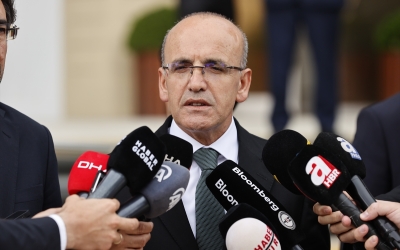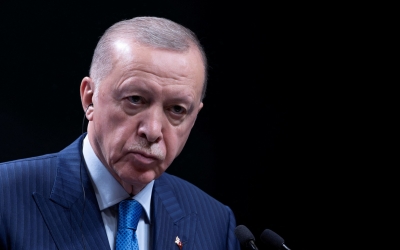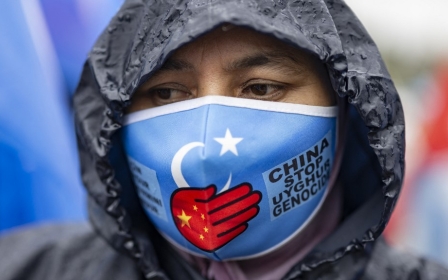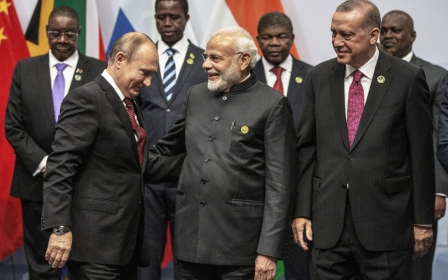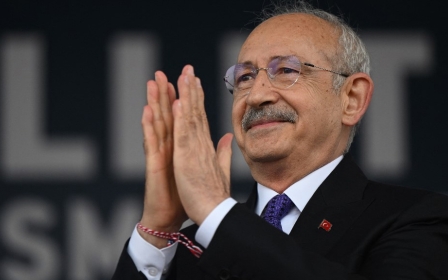Turkey: Erdogan tells AKP loyalists 'I did not change mind' on interest rates

Earlier this month, top officials from Turkey's ruling Justice and Development Party (AKP) gathered in the town of Kizilcahamam to strategise after their defeat in mayoral elections. Their focus was the economy and their spirits were high despite the country's recent economic hardships.
In 2023, Turkish President Recep Tayyip Erdogan had appointed Mehmet Simsek, a former Wall Street banker to spearhead economic transformation as finance minister.
Revered within the global banking sector, Simsek's appointment marked a return to market orthodoxy in Turkey following years of Erdogan-led economic planning.
Simsek reversed Turkey's low interest rate policy, implementing stringent fiscal measures that saw benchmark rates soar to 50 percent.
This shift attracted billions in hard currency, revitalising the Central Bank's reserves, which had previously dipped below zero.
New MEE newsletter: Jerusalem Dispatch
Sign up to get the latest insights and analysis on Israel-Palestine, alongside Turkey Unpacked and other MEE newsletters
That approach has won Simsek fans both outside the country and within it.
"The mood at the meetings favoured Simsek; he has overwhelming support within the party," an anonymous AKP official present at the convention told Middle East Eye.
'I believe low interest rates trigger lower inflation and high interest rates trigger higher inflation'
- Turkish President Recep Tayyip Erodgan
During a question and answer session hosted by Erdogan, ministers addressed concerns in an open environment.
One question pertained to the recent hike in legal interest rates, a statutory rate crucial for calculating late debt payments. Vice President Cevdet Yilmaz justified the increase to 24 percent from 9 percent, citing high inflation.
Then Erdogan spoke.
"I have not changed my mind on this subject," Erdogan declared, according to three AKP officials. "I believe low interest rates trigger lower inflation and high interest rates trigger higher inflation."
He hinted at potential adjustments later in the year.
The Simsek economic doctrine
Erdogan’s statement was par for the course. However, it marked the first time since Simsek's appointment and the subsequent policy shift that Erdogan reiterated his stance.
Sources close to Simsek clarified that Erdogan referred to statutory rates, not policy interest rates, but the message was clear: Erdogan still holds on to his economic theory.
People close to the president assert that he remains committed to Simsek's monetary policy aimed at combating high inflation. But they caution that no one should be under the illusion that the president would change core beliefs he has held for decades - beliefs he adopted in the 1990s when he was a protege of the Turkish Islamist Necmettin Erbakan.
"Erdogan's understanding of the current policy is simple," a source close to the president said. "The interest rates will drop after inflation drops. It is as simple as that."
Since taking office, Simsek has restored confidence among international investors, prompting major banks to issue favourable reports on Turkey's economic future.
He has introduced austerity measures, including a freeze on new public investments and cuts in state spending. Simsek is also pursuing comprehensive tax reform and working to remove Turkey from a global illicit money grey list.
Simsek’s influence has grown so much that some Turkish journalists dub him the "shadow prime minister". He successfully led the appointment and later dismissal of former central bank governor Hafize Gaye Erkan.
When demands for substantial pension increases rose before the March mayoral elections, Erdogan directed them to Simsek, signalling that he is the ultimate authority on the subject.
However, inflation remains a challenge. Annual inflation hit 75 percent in May, a year after Simsek assumed office. Simsek assured the media that "the worst was behind" and that inflation would gradually decrease.
Interest rates
However, despite leaving Simsek to his devices, Erdogan has a track record of expressing his unhappiness with interest rates publicly.
During an interview after the G7 summit in Italy, Erdogan reiterated his government's commitment to controlling inflation.
"But the whole issue again comes down to interest rates," Erdogan said. "Hopefully, with the steps we will take regarding interest rates, we will have moved inflation to a much more favourable position in the last quarter."
Even though almost every economist in Turkey expected some interest rate cuts in the last quarter in line with substantial drops in inflation, the statement unsettled some international investors, who viewed it as a sign that Erdoganomics still loomed.
Simsek’s policies have made loans more expensive and strict tax law compliance has burdened small business owners. "Your bank account gets blocked if you are late even a few days for VAT payments," complained Atalay, a store owner in Ankara. “Every other business owner goes through such a bad time due to tax debt.”
The overvalued Turkish Lira has also hurt businesses' competitiveness abroad. Simsek’s proposed tax reforms faced resistance, with Erdogan blocking certain measures, such as a special tax on stock exchange earnings and a significant hike in departure fees for Turkish citizens.
Simsek is aware of the challenges. AKP insiders say some exporters and zombie companies that constantly require cheap loans had been trying to pressure the government for more rate cuts.
The finance minister continues to navigate these complexities, aware that Erdogan and the AKP central committee have the final say. "He makes sure that everyone understands that he won’t step back from the programme," a source familiar with Simsek’s discussions said. "On the contrary, such lobbying efforts only strengthen the government’s resolve to realise the steps he envisioned."
On Monday, a delegation from Turkey's main opposition Republican People's Party (CHP) met with Simsek to convey a list of demands, including substantial increases in pensions and the minimum wage. Simsek, however, has been reluctant to adopt such measures, citing concerns they would help accelerate inflation.
"Unfortunately, we saw that there was no will to change their (AKP) understanding, which brought the bitter bill to the citizens again," Yalcin Karatepe, a senior CHP official, said following the meeting.
Middle East Eye delivers independent and unrivalled coverage and analysis of the Middle East, North Africa and beyond. To learn more about republishing this content and the associated fees, please fill out this form. More about MEE can be found here.


